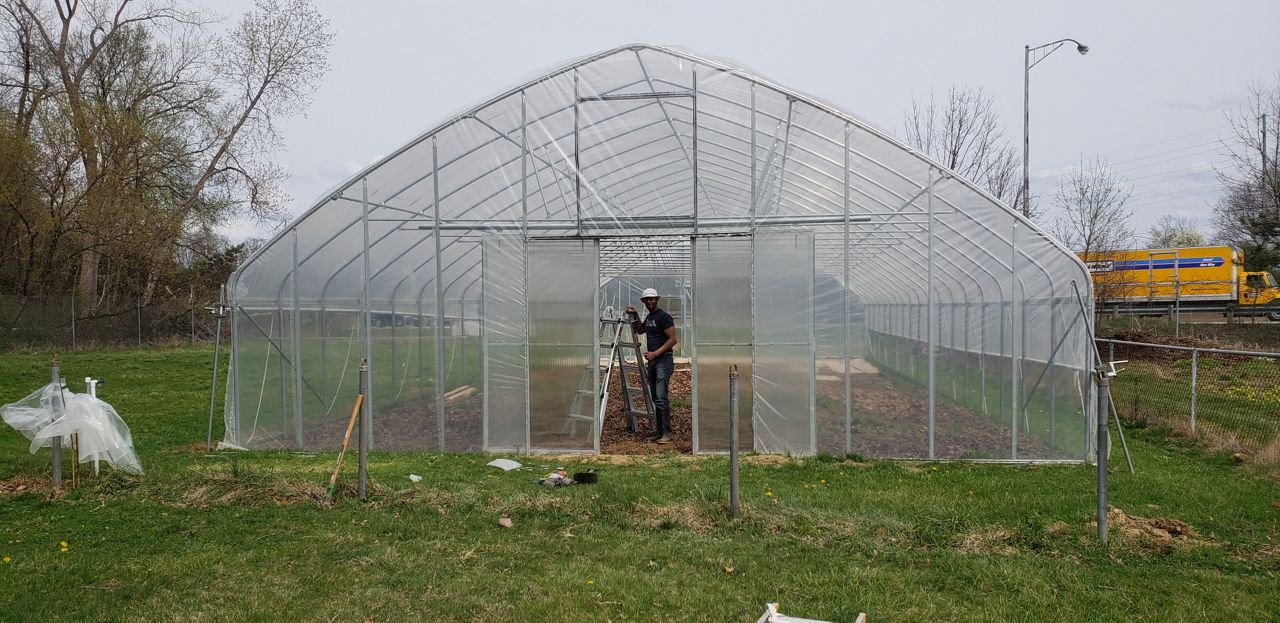AKRON, Ohio — High tunnels, also known as hoop houses, are going up around Akron and Cleveland as the quest for more nutritious and affordable food gains ground.
The Akron/Cleveland High Tunnel Seasonal Initiative, a program of the National Resources Conservation Service (NRCS), enables anyone with a little room on their property to learn how to install a high tunnel and grow their own organic food, organizers said.
High tunnels, like green houses, retain the sun’s heat to extending the growing season, enabling small farmers to eat more healthily, and potentially realize income from the food produced.
“We are helping provide organic and healthy nutritional foods because the majority of foods in grocery stores aren't local and they aren't organically grown with no chemicals or pesticides,” said Kashava Holt, who heads the Akron chapter of the High Tunnel Seasonal Initiative.
Holt hosts workshops to teach Akronites about high-tunnel gardening and how to install the structures, which average 30-feet wide by 72-feet high, he said.
“Having your own access to fruits and vegetables ensures that you don't have to come in contact with a lot of the chemicals that they have to use in the stores.,” he said. “They have to preserve it, and it is sitting on the shelf for a long period of time versus If you're growing it straight from the ground, within your garden space or your community.”
Holt is a University of Akron student studying construction engineering technology and fire protection technology. He was raised vegetarian on healthy foods and said high-quality food can help unite the community.
“Knowing food is one of the main catalysts to bring people together, I feel healthier foods will solve a lot of issues happening around campus,” he said.
Holt became interested in helping others grow food when he found the food options available to students in the university cafeteria lacking, he said.
“The options on campus were unacceptable and I felt we needed healthier options,” he said. “I sat down with a couple people, and I addressed my concerns, as far as what I was seeing on campus and inside the cafeteria, so they made some small adjustments.”
But Holt says he wanted more from the university, so he and some students launched the nonprofit Akron Urban Agriculture, which advocates for urban gardening, farming and sustainable practices in food production.
Urban Agriculture began conducting surveys and doing outreach to learn what the UA community wanted, he said. The group garnered support from student and faculty alike, hosting growing demonstrations and building a campus garden with about 10 raised beds.
“We had, like, 40 to 50 different fruits and spices and herbs growing, and that was the starting point,” he said.
Holt’s interest in gardening prompted him to attend an NRCS meeting, where he met an urban conservationist for the Akron area. He was hired by the Federation of Southern Cooperatives Land Assistance Fund, which partners with NRCS, to teach people to build and maintain high tunnels.
“The program I’m involved in is a very good program but it only helps so many people,” he said.
To reach even more people, Holt has continued working through Akron Urban Agriculture to teach people to urban garden, covering everything from the permitting process at the city to underground utilities and when it’s clear to dig, he said.
The pandemic has brought health into the spotlight, which has boosted interest in home gardening and organic foods, he said.
“This is more important than ever, just teaching people to become self-sufficient, and showing them that they don't have to go to the store. They can grow things right in their backyard,” he said. “And then, you don't put a lot of strain on the local food supply chain, as far as what you have in the stores.”
Holt will help anyone who is interested in urban gardening, but doesn’t have the know-how or manpower to install a high tunnel, he said.
“That's where I come in. That’s where my organization comes in,” he said. “We find people others may not know about that are in that workspace. They may need a volunteer or they may need an engineer or contractor.”
The next workshop of the Akron High Tunnel Initiative will be online on Saturday, April 24 at 1 p.m.
Visit Akron Urban Agriculture or the group’s Facebook page for more information.
